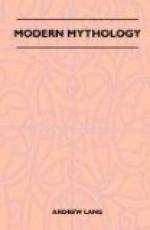Autobiographical
Like other inquiring undergraduates in the sixties, I read such works on mythology as Mr. Max Muller had then given to the world; I read them with interest, but without conviction. The argument, the logic, seemed to evade one; it was purely, with me, a question of logic, for I was of course prepared to accept all of Mr. Max Muller’s dicta on questions of etymologies. Even now I never venture to impugn them, only, as I observe that other scholars very frequently differ, toto caelo, from him and from each other in essential questions, I preserve a just balance of doubt; I wait till these gentlemen shall be at one among themselves.
After taking my degree in 1868, I had leisure to read a good deal of mythology in the legends of all races, and found my distrust of Mr. Max Muller’s reasoning increase upon me. The main cause was that whereas Mr. Max Muller explained Greek myths by etymologies of words in the Aryan languages, chiefly Greek, Latin, Slavonic, and Sanskrit, I kept finding myths very closely resembling those of Greece among Red Indians, Kaffirs, Eskimo, Samoyeds, Kamilaroi, Maoris, and Cahrocs. Now if Aryan myths arose from a ‘disease’ of Aryan languages, it certainly did seem an odd thing that myths so similar to these abounded where non-Aryan languages alone prevailed. Did a kind of linguistic measles affect all tongues alike, from Sanskrit to Choctaw, and everywhere produce the same ugly scars in religion and myth?
The Ugly Scars
The ugly scars were the problem! A civilised fancy is not puzzled for a moment by a beautiful beneficent Sun-god, or even by his beholding the daughters of men that they are fair. But a civilised fancy is puzzled when the beautiful Sun-god makes love in the shape of a dog. {5} To me, and indeed to Mr. Max Muller, the ugly scars were the problem.
He has written—’What makes mythology mythological, in the true sense of the word, is what is utterly unintelligible, absurd, strange, or miraculous.’ But he explained these blots on the mythology of Greece, for example, as the result practically of old words and popular sayings surviving in languages after the original, harmless, symbolical meanings of the words and sayings were lost. What had been a poetical remark about an aspect of nature became an obscene, or brutal, or vulgar myth, a stumbling block to Greek piety and to Greek philosophy.
To myself, on the other hand, it seemed that the ugly scars were remains of that kind of taste, fancy, customary law, and incoherent speculation which everywhere, as far as we know, prevails to various degrees in savagery and barbarism. Attached to the ‘hideous idols,’ as Mr. Max Muller calls them, of early Greece, and implicated in a ritual which religious conservatism dared not abandon, the fables of perhaps neolithic ancestors of the Hellenes remained in the religion and the legends known to Plato and Socrates. That this process of ‘survival’ is a vera causa, illustrated in every phase of evolution, perhaps nobody denies.




